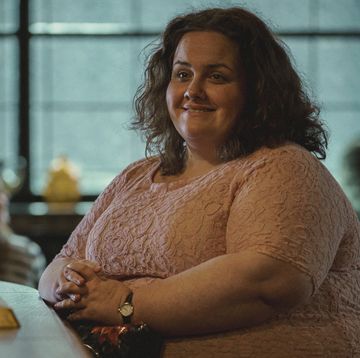I was lucky enough to see Amy Winehouse in person many times — not in concert, or at some club, but at the London Clinic where she was being treated for health and addiction problems.
It was late 2009, and I was there supporting my father who was being treated for terminal cancer. So I’d spend hours there, waiting for scans and MRIs and hanging around in coffee shops nearby.
I remember the first day I saw Amy. She walked in wearing one of her flamboyant dresses, tied with a bright bow and her signature beehive hairdo. She was on the skinny side, a wisp, and a shrimp of a girl at 5’2”. I assumed that the world of music and celebrity were taking a toll, and yet she looked vibrant and jokey. Even in her fragile state, she lit up the room. It was hard to imagine this was the same girl from the papers, the one the media loved to ridicule. Little did I know, she was struggling with an eating disorder, much like I had. And despite her bounciness and radiance, I saw a troubled look in her eyes. I saw a lost little girl. My dad leaned over and whispered, 'How could someone so young with so much talent be suffering so much?' He was right about her suffering. She passed away just 18 months later. And in a way, I saw a part of myself in her. Maybe, we all do.
One of the revelations in the new documentary about her life, Amy, is that she struggled with bulimia from her mid-teens onwards. Watching the film, I began to make sense of the tension between who we all thought she was, and who she actually wanted to be. Legend would have it that Amy was a drug crazed hedonist, who died of an overdose. But she didn't die from toxic substances. The problem was deeper.
At 15, Amy told her parents that she had found her 'perfect' diet: eating whatever she wanted and then throwing up afterwards. Amy's parents thought this teenage phase would pass, but it continued to plague and weaken her until she died at 27. I could relate to Amy: I was borderline anorexic and I know now that it had nothing to do with food. An eating disorder was ultimately my way of punishing myself for not feeling like I was good enough.
In a 2007 documentary: I Told You I Was Trouble, Amy says, ‘I’m quite an insecure person. I’m very insecure about the way I look. I mean, I’m a musician I’m not a model.’ Amy lacked self-esteem, as do many. And while this was often a rich source of inspiration for her music, it ultimately ruined her. I also suffered from low confidence as a teenager partly due to my oversensitive nature and partly due to the bitchy atmosphere at school. I was bullied and didn't truly believe in myself. And that absence of resilience sadly leads to problems later on in life.
According to the charity BEAT, 1 in 85 people in the UK struggle with an eating disorder, which is most common in girls age 12 to 20. My own issues with eating kicked in when I was 19 living in Paris during my year abroad surrounded by housemates who were obsessed with their weight. We lived off spinach and espressos —there is an immense pressure in France to look the part, which is elegant and slim. I fell into the trap. What started as a silly fad turned into a habit. It lasted 5 years on and off and it peaked when I fell into an unhealthy relationship. He was a lot older than me, and I was in awe of his intelligence so I allowed him to dominate me. Fear of upsetting him, speaking out, or being 'wrong' always got the better of me until I finally walked away.
Amy’s poor sense of self-worth is also reflected in her highly toxic relationship with Blake Fielder-Civil. Blake treated Amy badly because when you don’t value yourself, you feel you deserve horrible treatment deep down. When you are filled with self-loathing, you cannot accept love. And so you choose to be badly treated instead.
I was lucky, my Dad helped to snap me out of my eating disorder. One lunch-time at a pizzeria, I ordered sliced tomatoes, while he and my sister had opted for huge Four Seasons pizzas. The sight of my plate made my dad cry. And the sight of that was enough for me to wake up to the sorry state I was in.
But, Amy didn't get that break and her addictions went from bad to worse: coke, crack and heroin. Her body was too ravaged by years of making herself sick to sustain any more abuse.
Bulimia and anorexia are still taboo. Choosing not to ingest food can be perceived as a capricious act or a passing fad. That is exactly what happened to Amy. Parents often don't know how to react. They feel to blame and cannot see the way out of the tunnel. Doctors can help but eating disorders are still not a priority and the waiting time for a specialist appointment is 9 months minimum (on average). If Amy had a more acceptable sickness the community would have been campaigning for her in the streets. Instead the media mocked her skinny frame and presenters made jokes about her launching a cookery book. Her close circle tried to intervene but by then it was too late.
Could we have saved her? In interviews, she’s said many times that her music was her salvation. I started writing when my Dad died and then I wrote my first book when I saw a girl who looked like I once did. All gawky and awkward, and to me it was ugly. That little girl could have been Amy, it could be have been many girls.
Amy's music is a massive legacy, it touches our hearts, but she also left behind something even more important. She is a reminder, a witness to all of us to take better care of ourselves, to get help when we need it, and to intervene when we see the struggle in someone else.
-Words: Elizabeth Kesses












